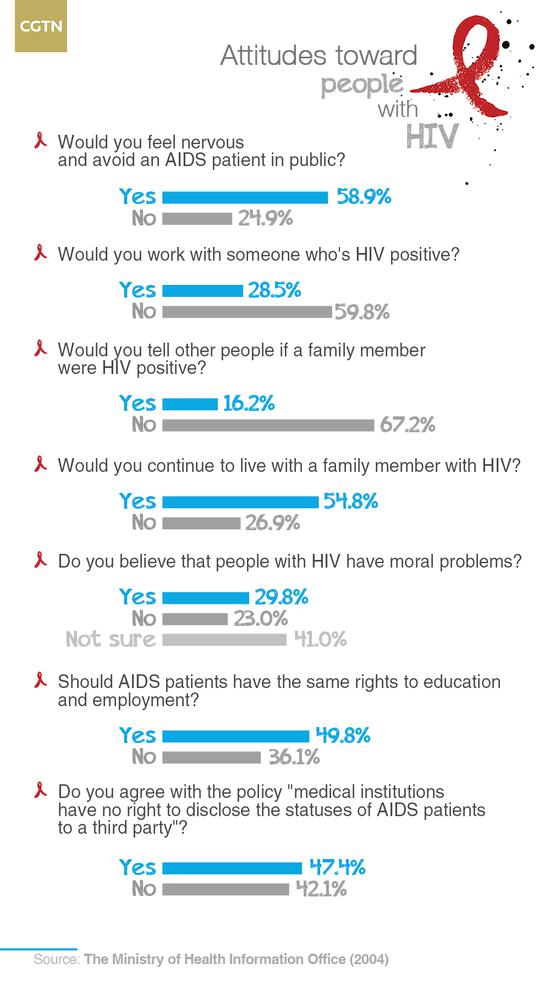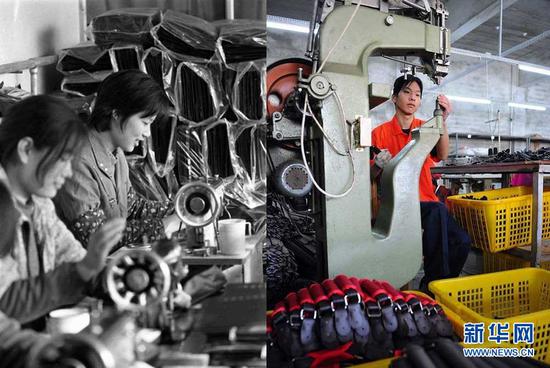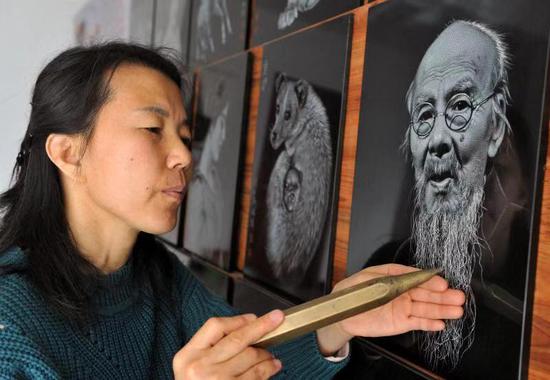Health officials recently confirmed some of the Chinese public's worst fears about HIV/AIDS. Around 850,000 people in China are living with HIV and AIDS by the end of September, up 14 percent from last year, officials from China's National Health Commission said in a press conference last week, ahead of the 31st World Aids Day on December 1.
There are around 80,000 newly-infected people in China every year, according to a joint evaluation by Chinese and United Nations (UN) officials. In the second quarter of 2018 alone, more than 40,000 new cases were reported, and by the end of this year, the total number of HIV positive people is expected to reach 1.25 million.
A notable new trend is that 95 percent of cases come from unprotected sex, as confirmed by an official from the Chinese Center for Disease Control and Prevention (China CDC).
In the past, unsafe blood transfusions were the main cause of HIV infections in China.
Meanwhile, young people are now a high-risk group with a 35 percent year-on-year growth rate in new infections, according to the center. Some 3,000 students are infected every year, with more than 80 percent of them from sex between men.
"Hook-up" apps blamed
The timing of these new figures coincides with a fresh wave of fear-mongering on China's Internet. Shocking stories have been circulating about HIV-positive men allegedly infecting others on purpose by tricking women they had met online into having unprotected sex, provoking outrage and calls for stricter laws punishing the perpetrators.
Screen captures of private chats surfaced online purportedly showing one man boast about how he had "successfully" infected a female college student. Another was seen grimly suggesting that his victim deserved it as she wasn't raped. In all reported cases, the perpetrators used a dating app to meet their victims.
"Prostitution and sexual activities spurred by drug abuse and social networking apps have posed threats for HIV/AIDS control," said Han Mengjie, director of the National Center for AIDS/STD Control and Prevention with China CDC.
Alarmed by the surge in new HIV infections in the country - against a backdrop of declining global trend as shown by World Health Organization (WHO) figures - some media and social media influencers were quick to point fingers at the liberal attitudes toward sex among young people. But there is little evidence suggesting that young people in China today are more sexually adventurous than older people, even with the convenience afforded by technology.
Public opinion followed suit, ranging from the hilarious -- with students pictured holding up banner that reads "Say no to hook-ups" - to bold claims that the increasing number of international travelers and students contributed to the rise.
China lifted the ban on people with HIV entering the country in 2010, a move highly commended by rights organizations, yet at the recent press conference, the country's health officials have found themselves defending the policy as being an international norm and inevitable part of China's opening up.
Besides the more commonly understood associations between AIDS/HIV with drug users and sex workers, the suspicion of foreigners began in 1985, when China's first case of HIV was found in a foreign traveler, who later died in the country.
That may have led to a long-held belief that AIDS/HIV was a western import due to perceived hedonism, despite the fact that up till late 2000s, most infections in China were found in impoverished villages and the country's southwest border regions, where injecting drugs was the main cause.
Stigmas run deep
"The face changes color when AIDS is mentioned" is a popular Chinese saying describing the fears people have of the disease. For a long time, it was considered a synonym to death, as well as a powerful deterrence from pursuing fringe lifestyles.
The association with criminality and sexual promiscuity has affected many marginalized groups in Chinese society. These include gay men, sex workers and drug users. The prevalence of HIV among those groups further increases the discrimination against them.
HIV positive people suffer a high level of perceived and internalized stigma. A 2010 study found that people who contracted HIV from "blameless" routes - i.e. blood transfusion - have less stigmatized experience compared to people who contracted HIV from "blamable" routes - i.e., sex with sex workers, resulting in the latter to not disclose their statuses to others.
A survey conducted by China's Ministry of Health in 2004 revealed some troubling attitudes among the general public toward people with HIV, 59 percent said they would be nervous around and avoid an AIDS patient in public, and nearly 60 percent of those polled said they did not want to work with someone who's HIV positive.

A survey by the Ministry of Health shows the public's attitudes toward people with HIV in China. /CGTN Photo


















































